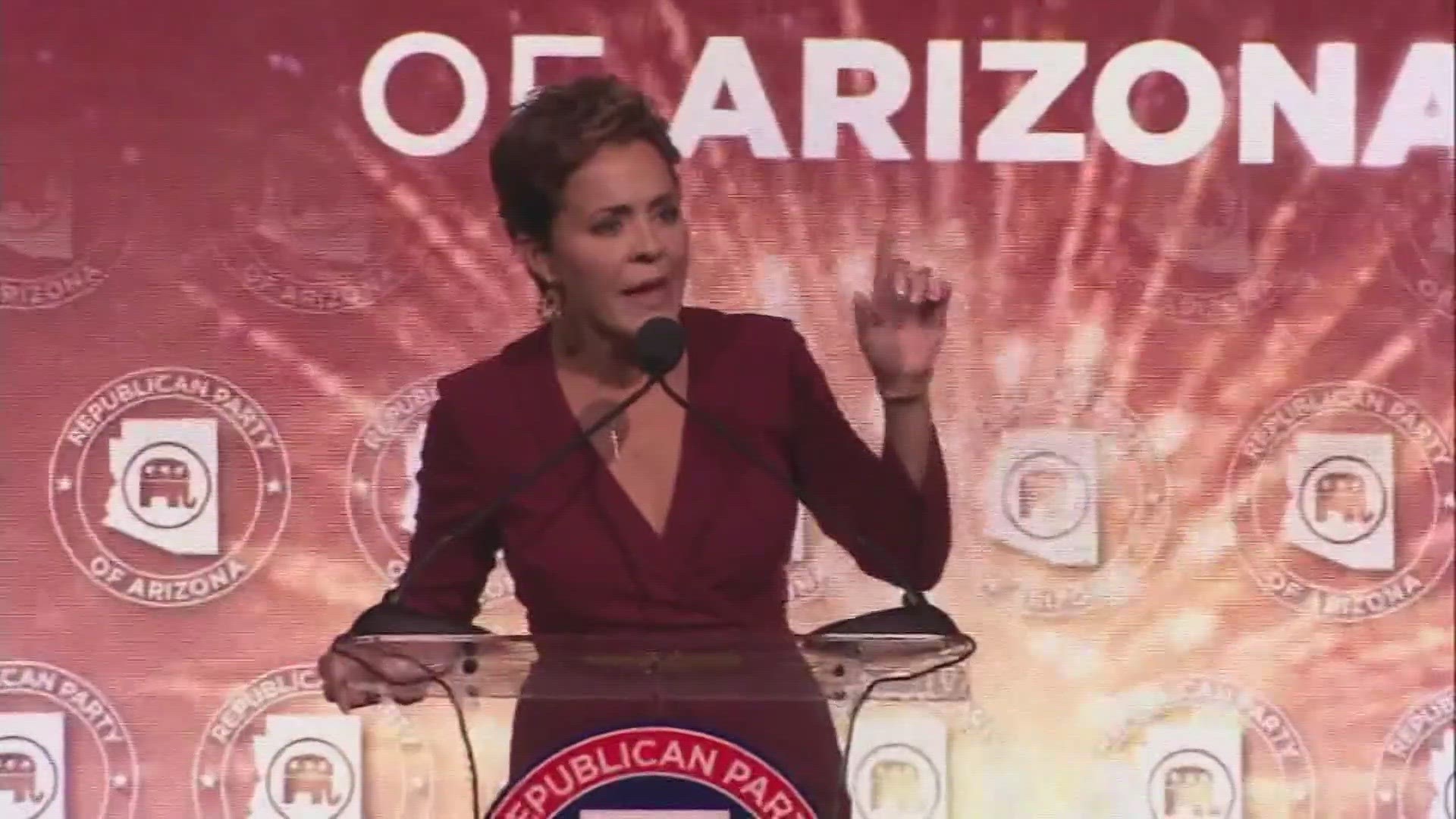PHOENIX — A judge has rejected a bid by election officials to throw out the last remaining election misconduct claim by Kari Lake, the 2022 Republican candidate for Arizona governor, setting up a three-day trial over the former TV anchor's challenge of her defeat to Democrat Katie Hobbs.
In a ruling issued Monday night, Superior Court Judge Peter A. Thompson refused to throw out Lake’s claim that centered on signature-verification efforts of early ballots in Maricopa County.
Thompson said Lake should have the chance to present testimony about whether Arizona's most populous county properly verified signatures on ballot affidavit envelopes.
The trial is scheduled to begin Wednesday.
Thompson said Lake isn’t contesting whether voters’ signatures on ballot envelopes matched those in their voting records. Instead, she alleged Maricopa County officials failed to perform any higher level signature verifications on ballots that had been flagged by lower level screeners for any inconsistency.
Lake faces a high bar in proving not only her allegation over signature verification efforts but also that it affected the outcome of her race.
Clint Hickman, chairman of the Maricopa County Board of Supervisors and one of the officials who Lake sued in her challenge, said in a statement that the county has previously shown in court that its signature verification process is “thorough, legal and always subject to bipartisan oversight.”
“We have nothing to hide,” Hickman said. “We are proud of our team, proud of our processes and confident we will prevail in a courtroom where the facts matter above all else.”
Lake was among the most vocal of last year’s Republican candidates promoting former President Donald Trump’s election lies, which she made the centerpiece of her campaign. While most other election deniers around the country conceded after losing their races in November, Lake did not.
Courts have dismissed most of her lawsuit. Late last week, Thompson heard arguments on whether or not the final claim should move ahead to a trial.
Attorneys representing Arizona election officials and Hobbs say Lake’s allegation that the election was rigged is based on unsubstantiated speculation.
Lake’s lawyers say there was a flood of mail-in ballots in Maricopa County, home to more than 60% of the state’s voters, at a time when there were too few workers to verify ballot signatures. Her attorneys say the county ultimately accepted thousands of ballots that had been rejected earlier by workers for having mismatched signatures.
The Arizona Supreme Court revived her claim challenging the application of signature-verification procedures, reversing a lower court decision that found she waited too long to raise it.
The state Supreme Court sent the claim back to the lower court to decide if there is another reason to dismiss it, or if Lake can show that enough votes were affected to change the outcome of the election, which she lost by more than 17,000 votes.
Three signature verification workers have said they experienced rejection rates due to mismatched signatures on 15% to 40% of the ballots they encountered.
Opposing attorneys said the workers’ speculation does not amount to a violation of the law or misconduct by election workers, and raised questions about whether the three workers truly knew the ultimate outcome of the ballots they had flagged.
Earlier in her lawsuit, Lake had focused on problems with ballot printers at some polling places in Maricopa County. The defective printers produced ballots that were too light to be read by the on-site tabulators at polling places. Lines backed up in some areas amid the confusion. Lake alleged ballot printer problems were the result of intentional misconduct.
County officials say everyone had a chance to vote and all ballots were counted because those affected by the printers were taken to more sophisticated counters at election headquarters.
In mid-February, the Arizona Court of Appeals rejected Lake’s assertions, concluding she presented no evidence that voters whose ballots were unreadable by tabulators at polling places were not able to vote.
The state Supreme Court declined March 22 to hear nearly all of Lake’s appeal, saying there was no evidence to support her claim that more than 35,000 ballots were added to vote totals. Earlier this month, the court sanctioned Lake’s lawyers $2,000 for making false statements when saying more than 35,000 ballots had been improperly added to the total count.
Up to Speed
Catch up on the latest news and stories on the 12News YouTube channel. Subscribe today.

